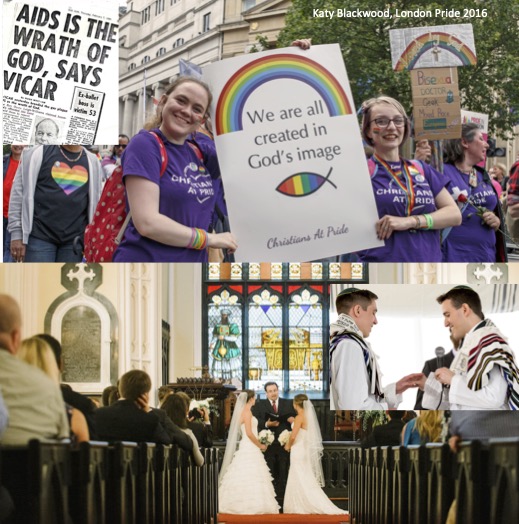Gay rights movements from the 1960s have given sexual minorities a new social visibility which has challenged traditional norms shaped by the religious heritage of the West. Mainstream LGBTQ+ history has often portrayed the gay rights movements as a campaign against and liberation from religion. Although the negative aspect of religion in LGBTQ+ rights campaigns and in the formation of the queer conscience has been hugely significant, an exclusive focus on it fails to account for the positive role played by a fair number of religious groups both before and after the Stonewall riots in New York in 1969 which function as a convenient marker of the start of a new era in LGBTQ+ history. There is also such a thing as liberation by religion which is visible as much in the support given by clerics —and even in some cases by institutional religion— to LGBTQ+ movements and campaigns, as in the creation of so-called gay churches and synagogues (and later inclusive mosques) or the rise of queer theology. The queer challenge to social norms includes reclaiming and reshaping religious tradition itself. This reshaping opens new possibilities for members of sexual minorities, including among ethnic and religious minorities, for whom and for whose families religion is a vital, central aspect of their lives and identities.
This course focuses more particularly on three national contexts, England, Scotland and the United States.
Students will be asked to read scholarly literature in the course of the semester and write two essays.
Download the Brochures
Assignments
Scholarly Papers and Chapters to Annotate with discussion in class (3 points in your final mark)
Annotations are made using the hypothes.is interface. Here is a step-by-step guide to using hypothes.is.
Please note that using hypothes.is on a tablet is very difficult. You will need a computer, preferably with the Chrome web-browser.
Your annotations will be discussed in class.
Using scholarly papers to answer a broad question (7 points in your final mark)
You will attempt to write an essay answering a broad question which will be presented to you by making use of relevant arguments developed in the scholarly papers you will have read. The essay should be referenced using the MLA style. CLICK HERE FOR MORE DETAILS.
End-of-term exam (10 points in your final mark)
A three-hour exam the last week of term in class. You will attempt to write an essay answering a broad question which will be presented to you by making use of relevant arguments developed in the scholarly papers you will have read in the semester. Paper versions of all your documents can be used in this exam.
Papers to annotate using Hypothesis
Access the papers for online annotation here.
My proofreading marks
This page will explain the meaning of the signs and acronyms I use when I mark your papers.
Recent Posts
To access older posts, please click on “All posts for Gay Rights & Religion” in the sidebar menu.
Please note that the posts are listed in reverse chronological order. When several new posts are published simultaneously, you should therefore start reading from the bottom up.

